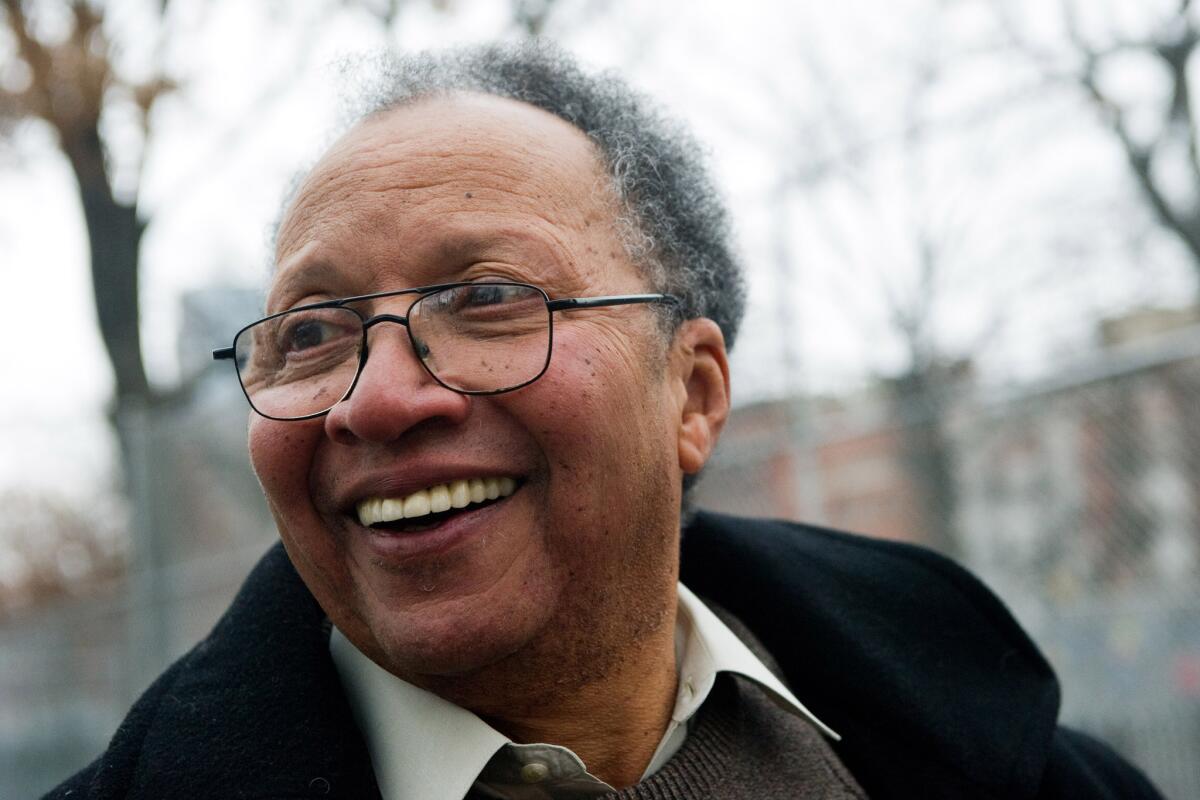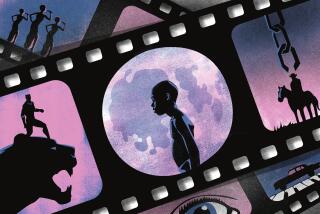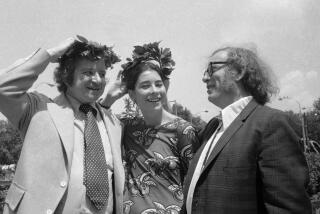Walter Dean Myers dies at 76; his books focused on young blacks

Like many of the protagonists in his dozens of young adult books, Walter Dean Myers was once a troubled, sensitive and intelligent young man living an aimless life. A writer’s heart beat in his chest, the passion for words there even as he stumbled through a childhood in the 1940s and ‘50s scarred by a broken family and an angry Harlem upbringing.
“I didn’t know I was going to be a writer,” he said in an interview with readers of Scholastic Books after his book “Scorpions” was published in 1988. “In fact, I didn’t know that there was such a job as an author. No one really encouraged me to write, it was just something I loved to do.”
Myers, 76, died Tuesday at Beth Israel Medical Center in New York after a brief illness, said his publisher, HarperCollins.
He became a writer almost by accident. Long after he’d dropped out of high school, completed a stint in the Army and worked in a series of low-wage jobs, he won a writing contest. His story “Where Does the Day Go?” became his first book.
Eventually, unsettled young characters became Myers’ trademark. He imagined them in all sorts of adventures, facing impossible difficulties. Collectively, his characters worked their way through the turbulent history of the 20th century, with its rampant injustices, especially against African Americans.
Later in his life, as the 21st century dawned and an African American president came to live in the White House, it hurt Myers that characters like his were still so scarce in literature for young adults. In 2013, according to one study, only 93 of the 3,200 children’s books published in the U.S. were about black people. Myers believed that the invisibility of people of color in literature discouraged kids from reading.
To the argument that there simply isn’t a market for young adult books about black people, Myers replied in a public radio interview that publishers were “shunting off thousands and thousands of children” and contributing to “a graduation rate through this country which is obscene.”
Myers was born Aug. 12, 1937, in Martinsburg, W.Va. He was a toddler when his mother died and his father gave him up to his first wife, Florence Dean, and her husband, Herbert, to raise in Harlem. His foster father was a janitor.
“I was raised by a guy who could neither read nor write, but who prided himself on the ideas of personal responsibility and discipline,” Myers told the Sacramento Bee in 2002.
Myers later incorporated the name Dean into his own to honor his foster parents. He had other role models, including a high school teacher who recognized his talent and encouraged him to write. But though he loved to read, Myers struggled academically and frequently got in trouble. He dropped out of Stuyvesant High School (which later claimed him as a graduate, much to his amusement).
As an author, he almost always wrote as if he were inside the skin of the young dropout he once was. His prose style was often a kind of young adult noir, with staccato rhythms, punctuated with short sentences. It was writing clearly designed to reach people like his foster mother, who loved books but who “probably read at a third-grade level,” Myers once said in an interview.
“She brought me a Bible,” one of Myers’ protagonists says of his own mother in “Monster.” Steve Harmon has been accused of murder for acting as a lookout during a robbery in which a killing is committed. At one point, Steve’s mother visits him in jail.
“The guards had searched it. I wanted to ask if they had found anything in it. Salvation. Grace, maybe. Compassion.” Later, Steve is alone in his cell. “I lay down across my cot. I could still feel Mama’s pain. And I knew she felt that I didn’t do anything wrong. It was me who wasn’t sure. It was me who lay on the cot wondering if I was fooling myself.”
At 17, Myers joined the Army and after his discharge worked in construction. But his love of books never left him, and once he found his writing voice, his ambition became ever grander, his curiosity seemingly boundless. He took on topics as diverse as Muhammad Ali, basketball, the Normandy invasion, the Haitian revolution and the Chisholm Trail. In so doing, he gave his young readers a tour of American and African American history.
In one of his most popular — and controversial — books, he took on the Vietnam War. Its unflinching depiction of warfare made “Fallen Angels” (1988) one of the most challenged books of its day. But in writing about the Vietnam War from the perspective of a young black man, Myers made that war, and other seemingly distant events, accessible to a wider readership. Broadening the audience for literature was always his intention, he said. He wrote the books that he himself had wanted to read, but never found, when he was an adolescent and teenager.
“I needed more than the characters in the Bible to identify with, or even the characters in Arthur Miller’s plays or my beloved Balzac,” he wrote in an op-ed article in the New York Times in defense of diversity in children’s literature. “As I discovered who I was, a black teenager in a white-dominated world, I saw that these characters, these lives, were not mine. I didn’t want to become the ‘black’ representative, or some shining example of diversity. What I wanted, needed really, was to become an integral and valued part of the mosaic that I saw around me.”
Myers, who wrote more than 100 books, credited his foster father for instilling in him a work ethic. “What I really have is the discipline to work all the time,” he said in the Sacramento Bee interview. “I finish one project, and I’m ready to immediately start the next.” Late in his career, he took up the latest of America’s wars, in books such as “Sunrise Over Fallujah.”
“When do you plan to stop writing books?” his young readers once asked.
“I plan to retire,” Myers answered, “seven minutes before I die.”
Myers, a three-time National Book Award finalist who lived in Jersey City, N.J., is survived by his wife, Constance, and sons Christopher and Michael. He was predeceased by a daughter, Karen.
Twitter: @TobarWriter
Times staff writer David Colker contributed to this report.
More to Read
Start your day right
Sign up for Essential California for the L.A. Times biggest news, features and recommendations in your inbox six days a week.
You may occasionally receive promotional content from the Los Angeles Times.







